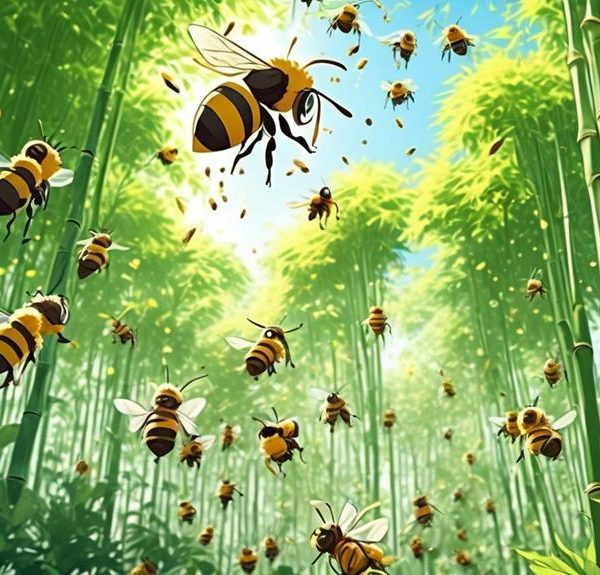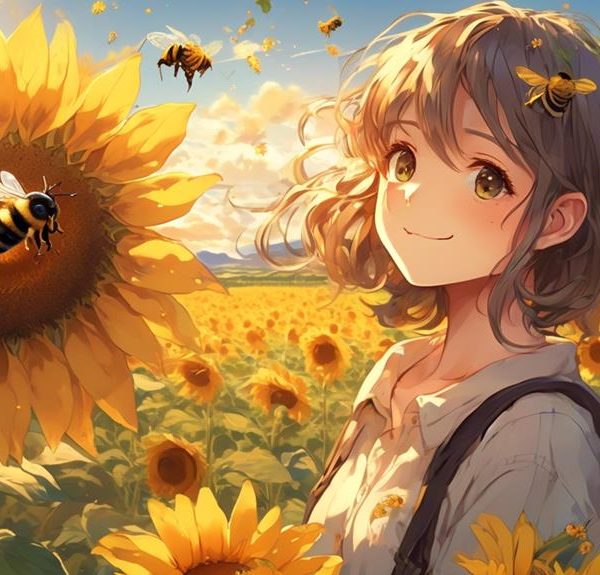Delve into the fascinating exploration of whether bees are irresistibly drawn to bananas, revealing unexpected complexities in bee behavior.
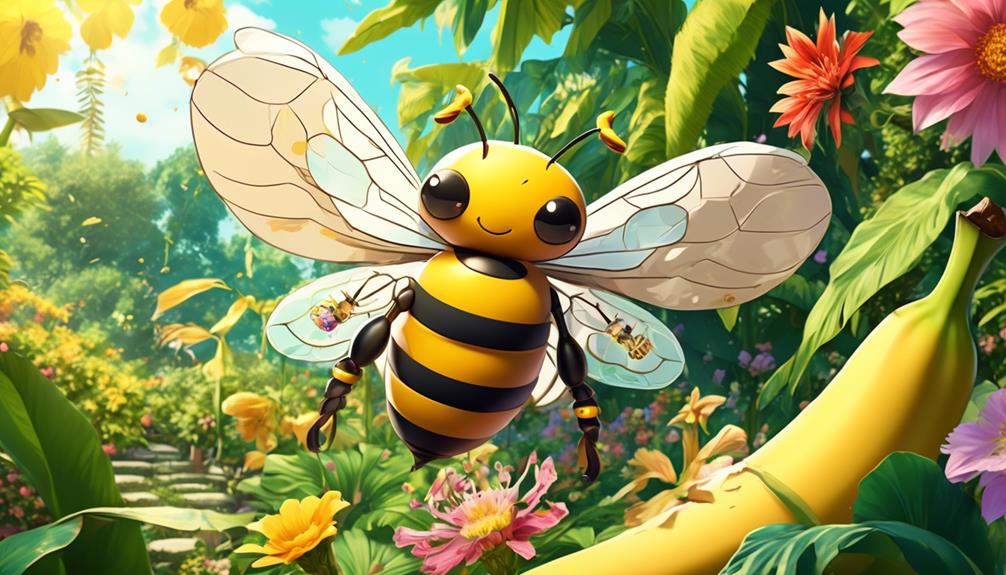
Do Bees Like Bananas
Imagine you're sitting in your garden on a sunny afternoon, a ripe banana on your picnic plate, and a buzzing bee comes hovering by, seemingly drawn to your tropical fruit.
You've probably never given much thought to the dietary preferences of bees, let alone whether they have a penchant for bananas. But the question is intriguing, isn't it? Are bees attracted to bananas or is it just a coincidence?
While we might think of bees as simple honey-makers and pollinators, their tastes and behaviors are more complex than you'd assume. Let's embark on this curious quest, seeing how deep the rabbit hole goes in understanding the relationship between bees and bananas.
Key Takeaways
- Bees are attracted to sweet substances and their diet primarily consists of nectar, so they are not naturally inclined to eat bananas.
- However, bees are attracted to the aroma of ripe bananas due to their acute sense of smell and olfactory receptors.
- Bananas have a high sugar content, making them highly attractive to bees, although they are also attracted to other fruits with high sugar content.
- Bananas emit a chemical called isoamyl acetate, which is the same compound produced by bees when they are in distress. This paradoxical relationship between bees and bananas can be used by beekeepers to calm their hives.
Understanding Bee's Dietary Preferences
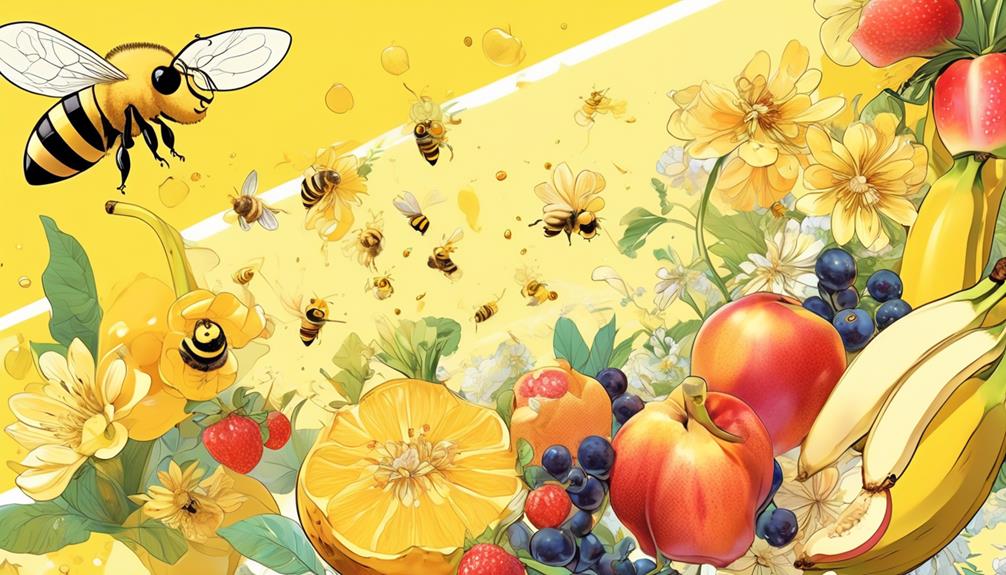
To understand why bees may be attracted to bananas, it's essential to delve into their dietary preferences and feeding habits. You see, bees, specifically honeybees, aren't just attracted to any food; they're particularly drawn to sweet substances. This is because their diets primarily consist of nectar, a sweet liquid produced by plants. This sugary substance provides them with the necessary carbohydrates to fuel their flight and daily activities.
But it's not just about sweetness. Bees are also attracted to certain scents. They've an acute sense of smell, enabling them to locate flowers blooming kilometers away. Their antennae, equipped with olfactory receptors, are remarkably sensitive to a wide array of fragrances. And guess what? Bananas release a potent scent similar to an alarm pheromone bees produce, which might explain their attraction.
However, while bees may be drawn to the aroma of bananas, it's important to understand that it's not a part of their natural diet. They're not equipped to digest solid food, so they don't typically consume fruits. Thus, while bananas may attract bees, they don't necessarily eat them.
The Role of Scent in Attracting Bees
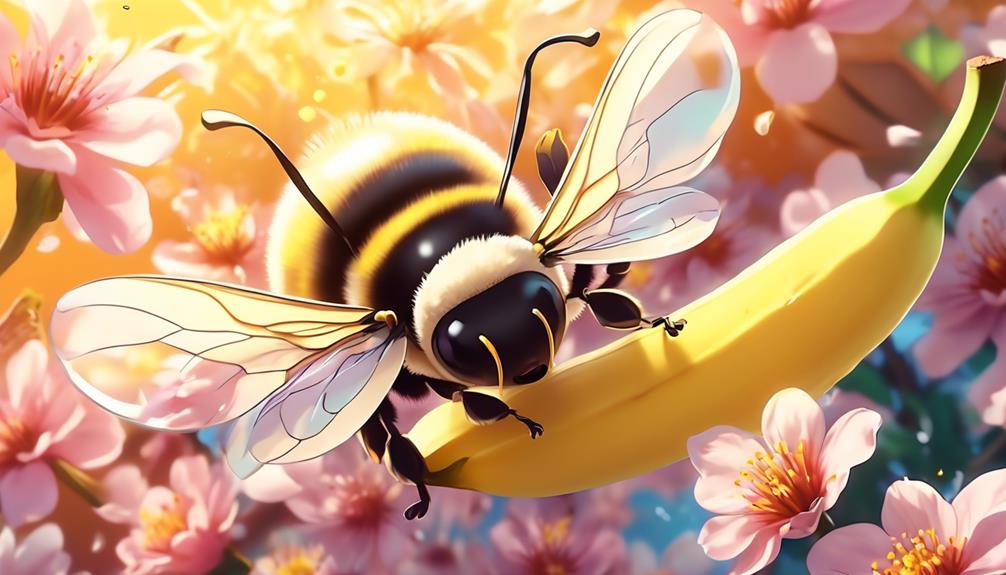
While the taste of sweetness is a powerful motivator for bees, it's the intriguing role of scent that truly sets their navigation systems buzzing. You see, bees possess an exceptional sense of smell, far superior to humans. Their antennae, equipped with olfactory receptors, can detect and differentiate between a wide range of scents. This ability helps them locate flowers and fruits, like bananas, bursting with sweet nectar.
Now, consider a banana. When you peel it, the aroma is immediately noticeable. For bees, this scent is like a neon sign flashing “Food here!” The smell of ripe bananas, specifically, is highly enticing to bees, even from a distance. It's a fruity signal that taps into their craving for sugar-rich food sources.
But there's a flip side. Overripe or rotting bananas emit a smell akin to the alarm pheromones of bees. This can cause confusion and even aggression among them. So, while the scent of a fresh banana might attract bees, a rotting one might actually repel them. Understanding these scent cues can help in managing bees, particularly if you're a beekeeper or a gardener seeking pollination.
Bananas: A Nutritional Breakdown
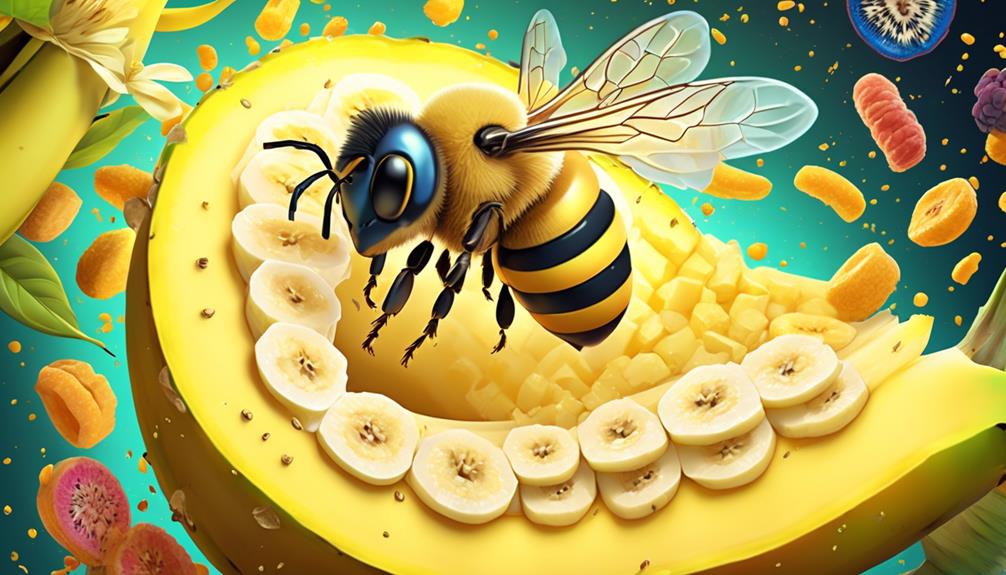
Diving into the nutritional profile of bananas, you'll find that they're packed with essential vitamins and minerals, making them not only a delicious food source for bees, but also a nutrient-rich snack for humans.
Each banana contains about 105 calories, primarily from carbohydrates which provide energy. They're an excellent source of dietary fiber, aiding in digestion. The sweet fruit is also rich in vitamin C, which boosts your immune system, and vitamin B6, essential for brain development and function. They're high in potassium, a mineral crucial for heart health and blood pressure control.
Additionally, bananas are a good source of magnesium, which is important for bone health and the proper functioning of nerves and muscles. They also contain trace amounts of various other nutrients, including vitamin A, iron, and zinc.
Notably, bananas are low in fat and protein, but they do contain small amounts of essential amino acids. The sugar content in bananas is high, which is why they've a sweet taste. However, it's a natural sugar, and when balanced with their fiber content, it doesn't lead to a spike in blood sugar as processed sugars do.
Bees and Their Interaction With Fruits
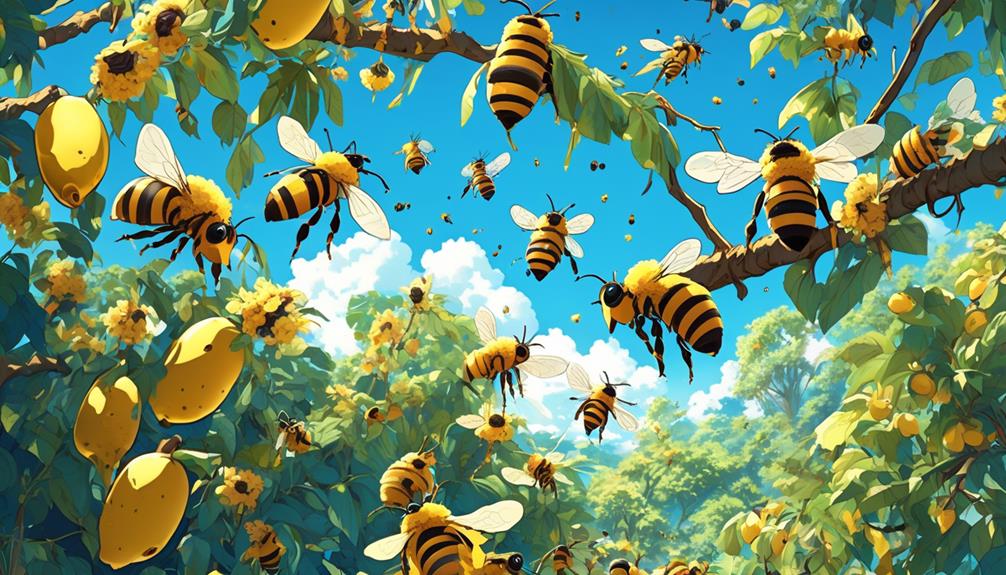
Having explored the nutritional content of bananas, it's worth examining how bees interact with this and other fruits. Bees are attracted to fruits mainly due to their sugar content. For instance, bananas may appeal to bees due to their high sugar content, but they're not the sole fruit that bees are drawn to.
Let's look at this in a structured way. Here's a brief comparison of how bees interact with three common fruits:
Fruit | Sugar Content | Bees' Attraction |
|---|---|---|
Bananas | High | High |
Apples | Medium | Medium |
Oranges | Low | Low |
The table indicates that bees' attraction to fruits is proportional to the sugar content; they're highly attracted to bananas, moderately to apples, and least attracted to oranges.
However, it's not always about the sugar. Other factors can influence bees' attraction to fruits, like the presence of nectar, fruit color, and smell. For example, bright, sweet-smelling fruits are more likely to attract bees. So while bananas may be a favorite, don't be surprised if you notice bees buzzing around your other fruits as well.
Bananas and Bees: An Unexpected Relationship
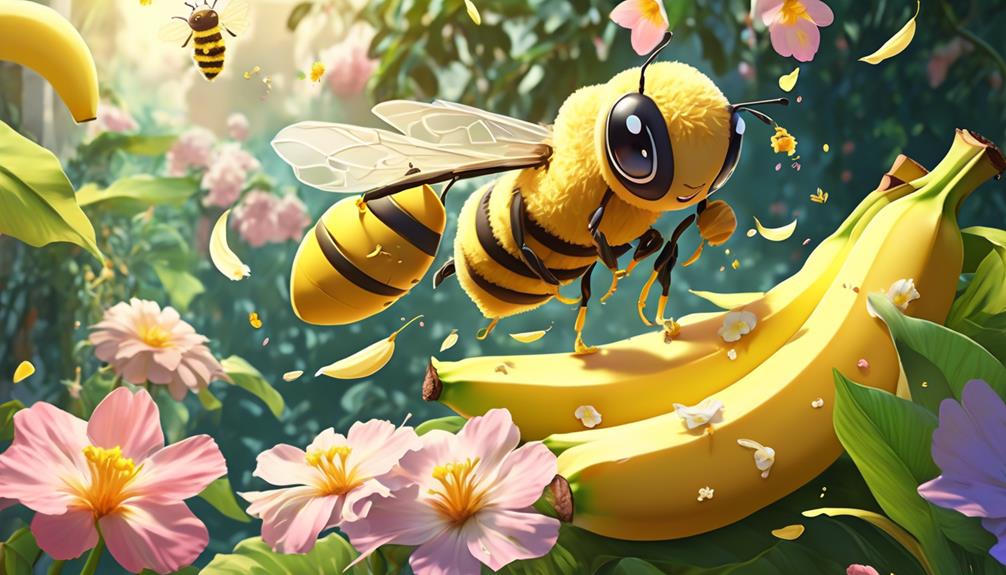
In exploring the peculiar bond between bananas and bees, you'll find an intriguing, yet unexpected relationship that goes beyond just the high sugar content. Bananas, ripe with their sweet smell, emit a chemical called isoamyl acetate. This same compound is also produced by bees when they're in distress, signaling other bees to come and help.
So, while you might think that bees would be attracted to bananas due to their sweetness, it's not quite that simple. Bees can actually become agitated if they smell bananas, as they associate the scent with danger. This is why, if you're around bees, you're advised not to eat bananas or risk causing a commotion.
Interestingly, beekeepers often use banana peels to calm their hives. They'll place the peel near the hive entrance, and the strong smell confuses the bees, making them less likely to sting. The relationship between bees and bananas is indeed a paradoxical one, where a signal of distress also becomes a tool for peacekeeping.
Understanding this relationship not only sheds light on the intricate world of bees but also demonstrates the interconnectedness of nature in surprising ways.
Implications for Beekeeping Practices
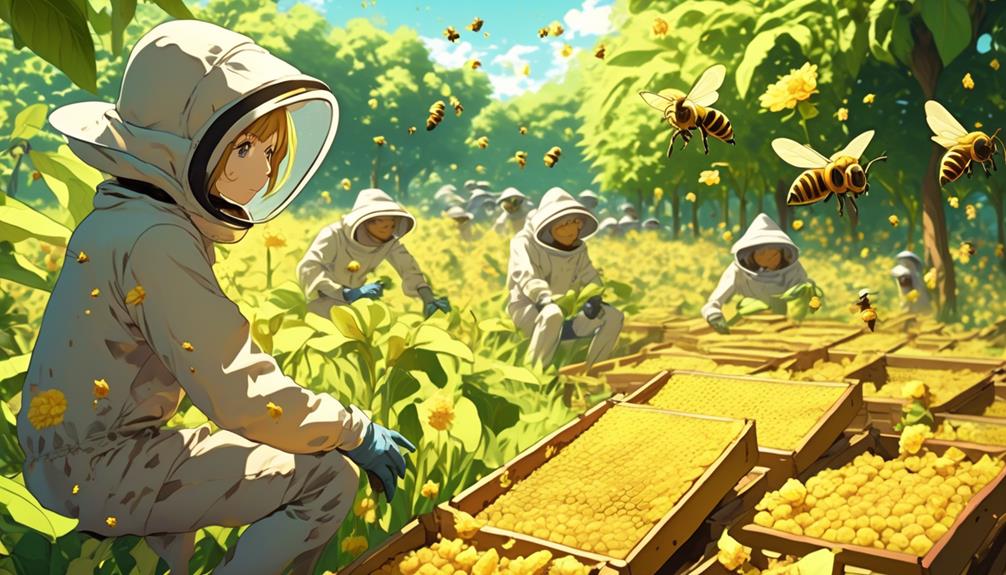
Given this paradoxical relationship between bees and bananas, you might wonder how it plays into beekeeping practices. Well, it's a fascinating aspect to consider.
The smell of bananas can mimic alarm pheromones, which can trigger aggression in bees. So, if you're a beekeeper, you'll want to keep bananas away from your hives. This doesn't mean you can't enjoy a banana snack, but you'll want to make sure you're a safe distance away from the hive before you peel it open.
Additionally, understanding this relationship can also lead to improvements in hive management. For instance, if a hive becomes too aggressive, beekeepers could potentially use bananas or a similar scent to disperse the bees more safely. However, research is still ongoing to understand the full implications of this.
This information could also be beneficial for those looking to attract bees for pollination purposes. While bananas mightn't be the best option, understanding what scents attract or deter bees can help in creating a more effective strategy.
Frequently Asked Questions
Can Bees Become Harmful if Attracted by Bananas?
Yes, bees can potentially become harmful if they're attracted by bananas. When bees are drawn to your banana, they might also be drawn to you, possibly resulting in stings if they feel threatened. Keep in mind, bees are generally harmless unless provoked.
Are There Specific Types of Bees That Are More Attracted to Bananas Than Others?
You're asking if certain species of bees have a stronger attraction to bananas.
It's not so much the type of bee, but rather the individual bee's exposure and reaction to the scent of bananas.
All bees can be drawn to the sweet smell, but those who've had prior exposure or a stronger sensory response may show more interest.
It's more of an individual preference than a species-wide behavior.
How Can I Safely Feed Bananas to Bees in My Garden?
To safely feed bananas to bees in your garden, you'll need to take a few precautions.
First, only put out ripe bananas because bees love the sweetness.
Mash the banana on a flat surface, like a plate, and place it in a quiet, sheltered spot.
Always keep a water source nearby.
Remember, don't put too much out at once to avoid attracting other pests.
Also, frequently clean the feeding area to prevent disease.
Can Bananas Potentially Harm Bees or Their Hives in Any Way?
No, bananas won't harm bees or their hives. However, it's essential to feed bees in moderation. Bees aren't accustomed to a diet of bananas and excessive amounts might disrupt their natural feeding habits.
Furthermore, a banana's strong scent can mimic bee alarm pheromones, potentially causing distress. So, while it's safe to give bees an occasional banana treat, it's best to stick with more traditional food sources like flowers and sugar water.
Does the Ripeness of the Banana Affect Its Attractiveness to Bees?
Yes, the ripeness of a banana can affect its attractiveness to bees. Bees are more attracted to overripe bananas because they emit a stronger smell, which bees detect and are drawn to.
However, you should take caution as bananas can potentially harm bees and their hives. It's always best to avoid feeding bees anything other than their natural diet to maintain their health and the health of their hive.
Conclusion
So, do bees like bananas? Yes, they do, but it's the scent more than the fruit itself that draws them in.
This unexpected relationship has implications for beekeeping practices. As a beekeeper, you might use bananas to attract bees, but beware – the same scent can also provoke aggression.
Understanding these intriguing dynamics can help you better navigate your beekeeping journey, ensuring a healthier and happier hive.

